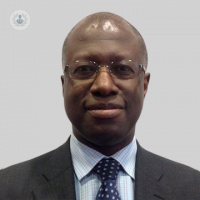5 common questions about vasectomy answered
Written in association with:Even though it is a popular procedure, there may still be some essential questions that people are wondering about a vasectomy. To help answer these questions, renowned consultant urologist Professor Francis Chinegwundoh has provided clear explanations.

When should someone consider a vasectomy?
When your family is complete and come what may you do not wish to have any more children. Vasectomy is male sterilisation. It can be done under a local anaesthetic or with the man asleep (general anaesthetic). It is less taxing than the female equivalent of female sterilisation (tubal ligation) and more successful. Many men feel that the woman has done the hard work of bearing the children and, before that, taken responsibility for contraception; so, he can contribute a relatively straightforward permanent contraceptive measure. The man should consider whether he would want children in the future should something happen to a child or he enter a new relationship in the future. Whilst vasectomy reversal is feasible, pregnancy cannot be guaranteed.
How safe is a vasectomy?
Vasectomy is a safe procedure, whether done under local anaesthesia or under general anaesthesia.
How effective is a vasectomy?
I would say that a vasectomy is 99.9 per cent effective in stopping a pregnancy from occurring. Rarely, the tubes that are cut in a vasectomy re-join, allowing sperm through and thereby a pregnancy. It is important to realise that the man is not sterile immediately after a vasectomy. There are sperm stored in the tubes which need to clear by ejaculation before the man is sterile. We ask the man to produce a semen specimen four months after the procedure. If there are no sperm in the sample, then the man is declared sterile and can abandon other contraception.
Can a vasectomy impact a man’s libido?
No. Vasectomy does not have an effect on sex drive. Nor does it affect the man’s erectile ability or orgasm or ejaculation. Vasectomy does not affect the level of testosterone.
How long does it take to recover from the procedure?
Recovery is a matter of a few days.
If you are considering to have a vasectomy, you can go to Professor Chinegwundoh's profile and request a consultation.


